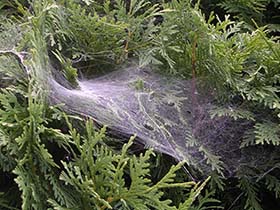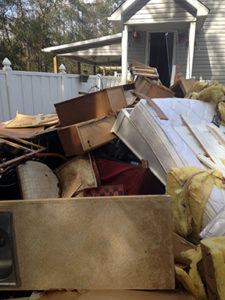Pest Problems After Storms – Spiders
go.ncsu.edu/readext?429302
en Español / em Português
El inglés es el idioma de control de esta página. En la medida en que haya algún conflicto entre la traducción al inglés y la traducción, el inglés prevalece.
Al hacer clic en el enlace de traducción se activa un servicio de traducción gratuito para convertir la página al español. Al igual que con cualquier traducción por Internet, la conversión no es sensible al contexto y puede que no traduzca el texto en su significado original. NC State Extension no garantiza la exactitud del texto traducido. Por favor, tenga en cuenta que algunas aplicaciones y/o servicios pueden no funcionar como se espera cuando se traducen.
Português
Inglês é o idioma de controle desta página. Na medida que haja algum conflito entre o texto original em Inglês e a tradução, o Inglês prevalece.
Ao clicar no link de tradução, um serviço gratuito de tradução será ativado para converter a página para o Português. Como em qualquer tradução pela internet, a conversão não é sensivel ao contexto e pode não ocorrer a tradução para o significado orginal. O serviço de Extensão da Carolina do Norte (NC State Extension) não garante a exatidão do texto traduzido. Por favor, observe que algumas funções ou serviços podem não funcionar como esperado após a tradução.
English
English is the controlling language of this page. To the extent there is any conflict between the English text and the translation, English controls.
Clicking on the translation link activates a free translation service to convert the page to Spanish. As with any Internet translation, the conversion is not context-sensitive and may not translate the text to its original meaning. NC State Extension does not guarantee the accuracy of the translated text. Please note that some applications and/or services may not function as expected when translated.
Collapse ▲
Common grass spider web on shrubs
Heavy rains can send ground dwelling spiders to “high ground”, which may bring them onto the foundation and siding of your home or send them indoors if they find an opening (including areas damaged by storms). Spiders may also hide behind window shutters, rain gutters, and other protected areas. Debris that remains on the ground for days-weeks will attract insects and other small arthropods (millipedes, centipedes, etc.) which can become prey for spiders. As you work to clean up outdoors, you may also run into spider webs strung across gaps in vegetation.
Although many spiders can bite, most of them are harmless and their venom has little, if any, effect on people other than individuals who are hypersensitive. However, it’s always a good idea to be cautious and wear work gloves when handling storm debris outdoors or moving items that have been stored undisturbed (indoors or outdoors) for long periods of time.
Black widow spiders are found across North Carolina, but actual encounters with people are relatively rare. Recluse spiders have been found in some areas of the state but they are still considered to be rare by comparison. Mechanical control (vacuuming corners and under/behind furniture, swatting the spider with a rolled-up magazine or newspaper, or stepping on them, etc.) should be more than adequate for the random spider that shows up indoors. Applying pesticides indoors for spiders probably isn’t necessary and probably is not a good idea during cleanup (you may be removing the very chemical you’ve just recently applied) If you prefer to use a pesticide, any common household insecticide will work. Some suggested pesticides can be found in the North Carolina Agricultural Chemicals Manual. Learn more about spiders in and around homes.



